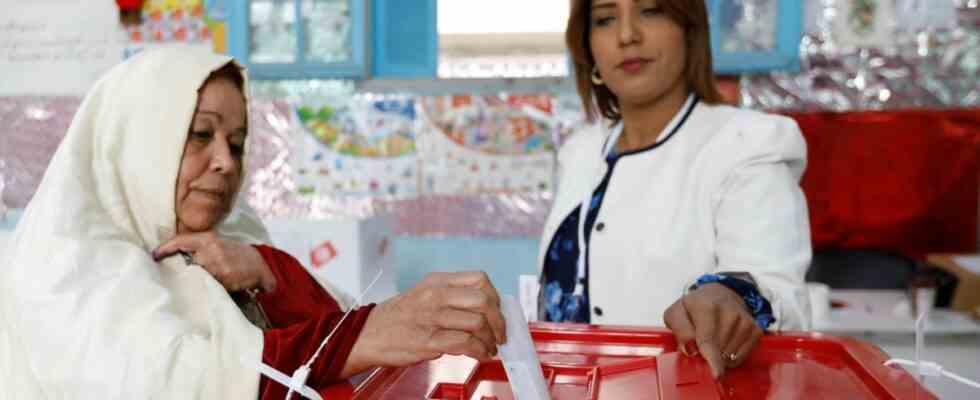As expected, the overwhelming majority of Tunisians boycotted Saturday’s parliamentary elections. After the polls closed, the head of the state election commission, Faruk Buasker, announced a poor turnout of 8.8 percent. Over a thousand candidates had applied for the 161 seats in the first chamber of parliament. But due to the short preparation time and the exclusion of political parties, there was almost no campaigning. There were many unknown candidates who were politically active for the first time.
Faruk Buasker cited the lack of foreign financial aid for the candidates for the first time since the 2011 revolution as the reason for the low turnout. Donations to political parties and non-governmental organizations were strictly controlled after President Kais Saied deposed parliament and the government last summer.
The opposition and civil society responded with relief to the low turnout and interpreted the result as a clear sign of distrust in the President and his style of government. “As a result, Kais Saied’s project failed,” said Kerim Sarrat, a political analyst from Tunis. During a visit to Washington, Saied’s advisory team indicated that a turnout similar to that seen in the constitutional referendum in the summer was expected. But at some polling stations, only 30 voters turned up instead of 30 percent, as 35-year-old Tunisian journalist Haithem al Mekki, who hosts the country’s most popular radio show, sneered. Especially young people like Mekki completely ignored the parliamentary election.
Urgently needed loans from the IMF are at risk
On the international stage, the election should be seen as a setback for Saied. The President recently used the US-Africa summit in Washington to promote his grassroots democracy project. According to the law professor, his coup last year would have prevented a civil war. He considers most of the political parties that emerged in 2011 to be lobby groups for corrupt businessmen. But his autocratic style of government is not well received either by the population or in western countries. Without a democratically legitimized parliament, the urgently needed loans from the International Monetary Fund (IMF) and the EU are in jeopardy. The Washington-based IMF had adjourned negotiations with the Tunisian government ahead of Saturday’s election.
Saied repeatedly argues that he represents the will of the politically disaffected population in rural areas and slums. There, many Saieds share the rejection of the political elite. But the President is silent on the acute social and economic crisis. When he voted, he spoke of a “historic opportunity” for citizens to “regain their rights from those who ruined the country.”
But the Tunisians have now broken with the president by abstaining from voting. Originally, many voters supported Saied because the paralysis of the system, including the live televised fights in parliament between the former regime supporters and Islamists, were perceived as unworthy and unpatriotic. Saied’s conservative but non-Islamist attitude met with approval. His criticism of the elite and promises of reform with regard to the bureaucracy also raised a lot of hope. So far, however, the President has not kept his promises and, above all, has done little to counteract the country’s economic misery.
Opposition calls on President to resign
The opposition, which had called for a boycott of the vote, called on Saied to resign because of the low turnout. He no longer has any legitimacy. Tunisia’s head of state dissolved the old parliament at the end of March. After the introduction of a controversial new constitution in the summer, Saied was able to appoint and dismiss the government and judges without the approval of parliament. The new representative body will only have limited powers. The influential Tunisian trade union federation UGTT, which has many members and has long stood by Saied, called the parliamentary elections “not very useful”.
The independent election observer initiative Mourakiboun reports on attempted vote-buying in the central Tunisian cities of Gafsa, Sbeitla and the small town of Nabeul. The expert missions of the American Carter Center and the African Union want to comment on the elections on Monday. The European Parliament has apparently also sent observers, but they are not supposed to comment publicly. For the first time, around a dozen Russian election observers appeared in front of the cameras at elections in Tunisia. A member said they wanted to establish a strategic partnership with the Tunisian authorities.
The new parliament has 161 seats. In some constituencies, however, there were no candidates, so that the parliament will not be fully occupied until further notice. The electoral commission expects the first results by Monday. A runoff election is expected in some constituencies. Ex-law professor Saied also changed the electoral law before the vote. Citizens could now only vote for one representative per constituency. In previous elections, parties or party blocs ran with several candidates, including women. This obligation was now waived.
The election day was marked by visible disinterest on the part of the citizens. In a polling station near the Independence Monument, the names of the 900 registered voters in the “Kasbah” constituency were pinned to pinboards, but rarely did any of them stray into the voting room. Plainclothes police officers and poll workers in vests stood around, bored.

